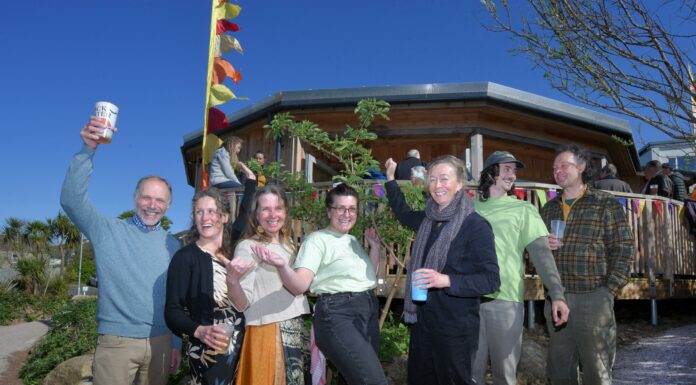Cutting through the jargon and nerd-speak, Business Cornwall presents you with an ‘everything you need to know’ guide to the world of Social Media. And perhaps most importantly, how it can create a positive impact on your bottom line.
It’s hard to escape all the talk of social networks. Twitter, Facebook, MySpace etc etc. They crop up in conversation on a daily basis, but just what the hell have any of these sites got to do with business?
The rise of social networking sites such as Facebook and MySpace are part of a wider phenomenon effecting communication and marketing across the globe. Referred to as ‘Social Media’, they represent a shift in how consumers interact with each other and the organisations or businesses they deal with.
These changes are not altogether comfortable for business and marketing teams who traditionally think along the lines of target markets, channels, messages and ROI. The sometimes ‘woolly’ nature of activity and the barrage of new terms or jargon all adding to the confusion.
However, digging underneath all the hype there are clear benefits for organisations that learn how to roll with the changing media and marketing landscape. There are opportunities to work with customers to innovate new products or services, more cost effective routes to market and opportunities to collaborate with teams across the country or even the globe.
Already, companies large and small are reporting the benefits. Computer manufacturer, Dell, has already attributed $3 million sales to its Twitter account.
Closer to home, St Agnes-based UKNetWeb reports increases in new business enquiries through its Social Media activity leading to higher order values. Two thirds of all enquiries now coming through Social Media platforms such as Facebook.
Cornwall, has led the way with innovative technology before and with Social Media it’s no different, with many local businesses and organisations starting projects of their own. The Duchy is already host to its own Social Media Café, a networking event for those using, or interested in Social Media. And it was one of only a dozen UK destinations to hold a ‘Twestival’, a festival and networking event held in Cornwall as part of 202 international events.
So what exactly is Social Media and how does it differ from traditional media such as radio, television and print?
Social Media encourages the consumer, or other interested party, to take part in a dialogue. Rather than the company creating messages and sending them out through advertising or PR, they invite the audience to share and add meaning as part of a wider conversation.
Through sites such as Facebook and Twitter, they encourage the audience to respond or send content on to their personal or business networks. This creates a ‘viral’ effect, where the message continues to be passed on through the community via their own efforts.
The emphasis moves away from just saying how good you are, instead showing how good you are by providing relevant, helpful information which demonstrates credibility and fosters positive associations with your company or brand. Customers are invited to help develop products or services, moving innovation from an R&D function to a more collaborative affair.
So, as business people how can we make the most out of emerging media platforms such as Twitter, Facebook and activities such as blogging, file sharing or social bookmarking?
Tonick Media marketing director, Aren Grimshaw, explains: “The key to using Social Media for business lies in a well defined strategy that links your company objectives with the markets you want to work with and the technology platforms available.
“Where many companies come unstuck is in starting with the technology and working back. They think that they need a Facebook presence or a MySpace page without fully understanding whether their market uses these sites or how it can be used to meet objectives.”
He continues: “They find themselves spending huge amounts of time maintaining their profiles and uploading content for no result, loose enthusiasm and walk away from it.”
Grimshaw regularly presents a Social Media Taster Course for businesses and other organisations looking for an introduction to the medium. In this course he walks through the definitions, popular platforms and highlights a number of impressive case studies.
What are the Social Media services on offer and how can they be used by businesses?
There are literally thousands of different Social Media services for businesses to choose from. However, many of these come down to a dozen or so key types defined below. Success in using these sites is not a matter of how many are used but more about selecting the appropriate ones for your business and its customers.
Social Networks
Sites such as Facebook, MySpace, Bebo, LinkedIn and Ecademy are referred to as ‘Social Networks’.
These sites allow the individual user to create and maintain a profile on the internet like a personal webpage. Users can share information about themselves, their interests etc or can link to information or content they believe to be worthwhile or interesting. Users can find friends, colleagues and acquaintances on thes services maintaining their relationships with them via the sites’ through messaging, sharing and other related services.
Many sites allow users to join groups (online communities of shared interest) or become fans of pages (organisation profiles).
Social Networks can be useful to businesses in; raising awareness, engaging with consumers, testing ideas or products, gaining new business or keeping in contact with existing customers or interested parties.
Blogs, V-Logs and Microblogs
Blogs or ‘Web Logs’ is the name given to websites that are regularly updated by an individual or organisation with new articles or ‘posts’.
There are a range of blogging styles ranging from detailed ‘How To’ guides or tutorials through to personal accounts or diaries. More recently there has been growth in V-Logs and Microb logs which have spun out of the blogging phenomenon.
V-Logs are similar to standard blogs with the difference being that entries are left in video format instead of written articles.
Microblogs allow the user to submit short entries instead of fu articles, with each submission limited to 140 characters with the potential to link to more detailed information.
Popular blogging platforms include; WordPress, Blogger and Microsoft Live Spaces. The most popular mircoblogging platform is Twitter. V-Logs may use one of the other platforms or can be hosted on video sharing sites such as You Tube, Vimeo or Viddler.
Blogs of all types offer opportunities for businesses and organisations to begin an ongoing conversation with customers, they allow customers to comment or add to articles and can be effective in ‘passively marketing’ products or services.
File Sharing Sites
Sites such as You Tube, Slideshare, Scribd, and Flickr allow users to upload and share documents, images, videos, presentations or other files online. These files can be shared with teams, customer groups or openly to anyone on the Internet. Many services allow the uploaded file to be reused (referred to as ‘embedding’) on other sit to make static information more interesting or engaging.
Interesting content can become ‘viral’ meaning that consumers forward links to the content via their social network or their own websites/blogs.
These sites have a range of uses to businesses or organisations including knowledge sharing, making marketing materials available online and creating buzz or word of mouth recommendation around your product or service.
Forums
Forums are online discussion or messaging boards where participants with a shared understanding or interest can leave open me sages to each other. They can be seen as the natural evolution of the traditional bulletin board.
They foster the growth of communities around a shared intere or topic and can be stand alone or part of another website. Forums can have a number of uses to businesses or organisations including; the ability to foster a community, provide a platform for customers to contribute their own content or enabling common questions or issues to be answered by other users.
Wiki Sites
Wikis are websites that allow the easy sharing of information through the editing of a number of interlinked web-pages via wiki software. The term ‘Wiki’ comes from the Hawaiian word for ‘Quick’.
The most prominent wiki site is Wikipedia, the multilingual encyclopaedia supported by the non-profit Wikimedia Foundation.
In a business context they can be an efficient platform for team collaboration, knowledge management and information sharing.
Social Bookmarking
Social bookmarking sites enable internet users to store, organize, search, and reference bookmarks or their favourite websites so that they can return to the information at a later stage.
Unlike the bookmarking function on a typical internet browser, social bookmarks are stored in an online directory and can be accessed from anywhere via a password and login.
Social bookmarks really become ‘social’ when the referenced information is shared with other users who can access your links or where you may access theirs.
One of the largest social bookmarking sites is Delicious.
Social bookmarking can be useful to businesses in sharing information across teams, referencing information for later use, identifying popular pages or websites on the web and in promoting your own content.
Virtual Worlds
Virtual worlds are computer simulated environments where internet users can adopt a virtual persona or body in order to navigate the environment or socialise and interact with other users.
The most notable virtual world is Second Life where members can potentially profit from their activities via the exchange of Linden Dollars (a virtual currency which operates within Second Life).
Virtual worlds have a number of business uses including opening up virtual offices to meet customers or other parties, testing building designs or layouts within a realistic working environment or hosting events in a location where potentially anyone can attend via their home PC or laptop.
If you would like to learn more about Social Media and how it applies to your business please get in touch with Aren Grimshaw at Tonick Media on 01209 718688 or visit www.tonickmedia.com for more information.






